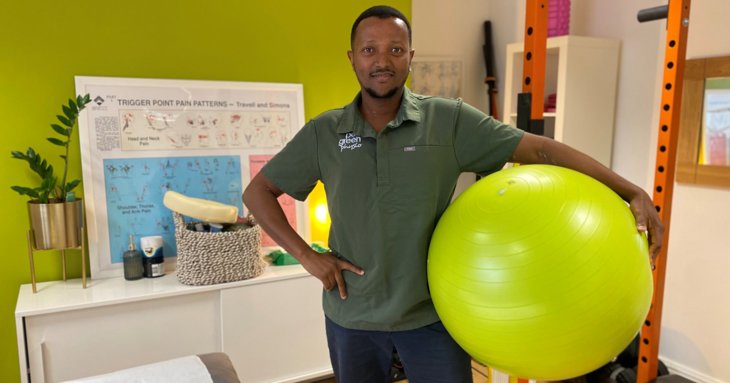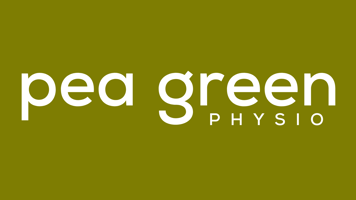Helping you move better, feel stronger and live more independently following serious injury or disease to your nervous system, Cheltenham clinic Pea Green Physio takes a bespoke, integrated approach to rehab that combines hands-on physiotherapy, modern techniques and evidence-based care.
SoGlos chats to the clinic's neuro specialist, Wilson Mbutu about the treatments Pea Green uses to help patients regain confidence in their everyday movement, both at the clinic and out in the community.
What is neurological physiotherapy, in a nutshell?
We think of neurological physiotherapy as targeted rehabilitation for your nervous system – that is the brain, the spinal cord and the peripheral nerves – when they become injured or diseased, for example if you've had a stroke, traumatic brain injury or multiple sclerosis.
What we do is try to retrain the pathways that control the
movement, the balance and the sensation. We use the theory of neuroplasticity,
whereby we use task specific exercises, sensory drills, posture correction and
some hands-on guidance, to rebuild strength and coordination to help people
regain the independence that they seek for everyday life.
Tell us more about the conditions it is used to treat.
Anyone whose movement or sensation has changed after a
neurological event or condition can benefit from it.
This includes stroke survivors, which is probably the cohort
we see the most. We can help to rebuild their walking and balance and also
manage their pain, for example in their shoulders or lower limbs.
It is also used to help people with longer term conditions,
such as Parkinson's, improve their coordination and manage fatigue.
Then we have conditions such as multiple sclerosis, or MS.
We help them to adapt to how their strength changes over time.
We also have post traumatic brain or spinal cord injury
patients, who have been in an accident or a fall which can leave them quite
limited. We can help these kind of patients to regain some sort of mobility, if
possible; and also help with some of the cognitive deficits that they might
experience.
Its also used to treat patients with conditions such as
peripheral nerve injuries – foot drop is a quite a common issue we see in
clinic. Then finally, we have functional and neurological disorders, such as
cerebral palsy.
Treatments are tailored to fit each person's diagnosis,
their symptoms and their goals, whether it's about reducing their spasticity –
when a muscle is really tight – mastering things like tears, or just getting
through life without having too much discomfort.
What are the neuro treatments that you offer to patients at Pea Green?
We blend hands-on techniques with the use of technology and
evidence based methods in our treatment plans. We start with a comprehensive
initial assessment, where we spend a lot of time establishing a detailed
history of what happened, or how it has been over a period of time if it's long
term condition.
We then go on to assess movement, looking at what patients
can manage at the time and what we are trying to achieve.
Then we move on to retraining, using real world drills to
retrain movements that translate into daily tasks, like sitting and standing,
stepping, reaching for things – for example, if you're struggling with even
just feeding yourself.
Then we also have the general re-education of gait – how you
walk, how you mobilise and balance work, which is some of the most important
rehabilitation we do long term.
We're also thinking about pain relieving modalities – we
have bioelectric therapy here in the clinic – and also just some soft
tissue work done by our own hands, where we try to ease some of your pain so
that you're able to do some of the rehab we're trying help you
accomplish.
I have a good case study of a patient who has a long-standing brain injury. It's a guy in his 50s, he came to us after a few years of already having the injury and he was falling quite a bit, probably on a weekly basis.
What we have done over the last 12 months or so is focus on retraining his balance, trunk stability and fatigue management; and now the falls have dropped significantly to maybe one a month or so. He still falls but is significantly improved due to the neuro rehabilitation we have been able to offer.
How can the elderly or people with limited mobility access neuro physiotherapy with Pea Green?
We’ve introduced a service here at Pea Green where we can bring the clinic to you. We can carry out home visits in Cheltenham and the surrounding areas – at the moment, on Wednesday mornings, evenings and Saturdays – if you have mobility issues that stop you from being able to leave the house, with the aim of helping you regain some of that mobility.
It's flexible – we can see people at a time that suits them,
for example late evenings, at least initially; and then from there we can get a
bit more of a routine as we go along and see what works for both us and the
patient.
As well as neuro, domiciliary and MSK therapies with myself, (specialist MSK physiotherapist) Helen Walsh also carries out home visits from the Cheltenham clinic, for chronic pain and MSK.
We can also visit local nursing and retirement homes,
where many of our patients are based. This service removes the need for travel
while ensuring continuity of care, enabling us to meet the unique needs of care
home residents, from recovering after hospital stays, to maintaining mobility
and preventing falls.
We work in partnership with care home staff and families to
ensure treatment is tailored, practical and fully integrated into residents’
daily routines. Benefits for care homes include improved resident wellbeing,
mobility and confidence, adding value for families and reducing the risk of
hospital readmissions.
Also, right here in our clinic. We have fully disabled
access in the rear, where there's an entrance ramp. At the moment I have
at least two patients who use this regularly – we try to get patients to be
able to also come into the clinic as part of their independence. So there're a
few options available.
How can patients book neuro physio treatment with Pea Green?
One of the easiest ways is to simply
call our patient care team on 01242 420810, or
you can email info@peagreenphysio.co.uk
and the team will answer your questions as quickly as possible.
If you're unsure about what is most appropriate for you, we offer an express assessment where you can come in, we can talk about what it is going on and if you feel we can help you, you can simply go online and book yourself in for a suitable session. If you would like to explore home visits, do book in for a discovery call with myself to discuss this further.
















.jpg?width=432&height=227&rmode=pad&bgcolor=ffffff&quality=85)




